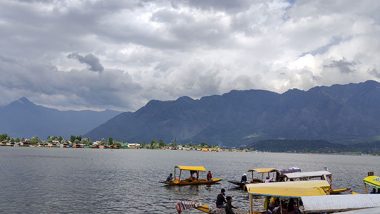Srinagar [Jammu and Kashmir], May 8 (ANI): In a major development, the abrogation of Article 370 in Jammu and Kashmir has brought transparency into the region's financial system and led to the growth in the economy.
After August 5, 2019, the move, which saw the special status of J-K being scrapped and the region bifurcated it into two Union Territories, has brought about unprecedented transparency in governance.
Under the new system, the government procurement, recruitment, spending of its resources, taxation or deployment of resources are all available online 24x7, making the entire process more transparent.
The reforms have ensured that every rupee spent on the ground is accounted for and that money is going directly to the people, without any intermediaries involved.
The new financial system, which has been introduced in the region during the past three years was unheard of in J-K till 2019.
Key reforms introduced by the government in J-K's financial structure have brought the fiscal system of the Himalayan region at par with any other progressive arrangement across the country.
Implementation of transformative reforms such as Budget Estimation and Allocation Monitoring System (BEAMS), online submission of bills through J-K PaySys, mandatory administrative approvals, technical sanctions and e-tendering, digital payments, GFR, GeM and related measures have brought financial systems in J-K at par with other states and UTs across the country.
It is for the first time in the past 70 years that people are able to oversee works being executed on a real-time basis on the "EMPOWERMENT" (Enabling Monitoring and Public Overview of Works being Executed and Resources for Meaningful Transparency) a web portal that hosts all the works being executed in the UT and allows public oversight over all works under execution.
After 2019 the helmsmen have worked hard to promote good governance in financial management. It has been one of the core objectives of the government. The financial system in J-K has become one of the most transparent systems anywhere.
Publication of pictorial e-compendiums related to projects completed under Back to Village, District Capex, UT Capex and JKIDFC have led to the citizens remaining aware about the development works taking place in their areas.
Digital payments, major reforms in J-K Bank, publication of important manuals relating to budget and audit, 100 per cent physical verification of works have ensured implementation of projects within the stipulated deadline without cost over-runs.
The entire financial set-up of Jammu and Kashmir has been revamped during the past three years. This has led to wiping out corruption at all levels.
The J-K Bank has registered gradual improvement in its productivity per Rs 100 of aggregate earnings. The Bank has been in a position to generate Net Value Added or NVA to the tune of Rs 37.94 (FY 2019-20), Rs 41.39 (FY 2020-21) and Rs 42.88 (FY 2021-22) respectively.
Putting a completely new financial setup in place is among the key changes that have taken roots in J-K post scrapping of Article 370, a temporary provision in the Constitution.
In the Financial Year 2022-23 the government completed 92000 works in comparison to 9000 works before 2019. The works that are taking place in the Union Territory are 3-4 times more on the same amount of money and without facing any obstacles.
In 2022-23, Panchayats completed 43000 works which was just about 3000 before the new financial system was made operational.
The number of beneficiaries receiving old age and widow pension has increased from 4.5 lakh to 10 lakh from 2019 to 2023.
As many as 11.5 lakh beneficiaries have been weeded out from the Consumer Affairs and Public Distribution Department. The money is reaching where it is intended to reach and there is no siphoning of public money due to direct beneficiary transfer and digitisation of services.
The J-K Finance Department has become one of the most vibrant departments in the country. It has achieved financial discipline and saturation of all beneficiary-led schemes.
Implementation of centrally sponsored schemes has helped the common man grow and get all the benefits that couldn't reach him due to Article 370 being in vogue.
According to the officials J-K received Rs 7,655 crore in the year 2021-22 under the centrally sponsored schemes. The amount was increased to Rs 8,938 crore in 2022-23, representing a roughly 15 per cent increase.
For the first time since 1947 around Rs 9,000 crore reached the average man in J-K directly through digital transactions.
In the fiscal year 2022-23, 2,63,595 persons were employed in Jammu and Kashmir through various initiatives.
Figures vindicate the growth that J-K has witnessed after the Article 370 was read down by the Centre in 2019. The so-called special status was nothing more than a road block which kept the Himalayan region deprived of development and prosperity.
In erstwhile J-K State funds sanctioned by the Centre getting lapsed was a routine. Politicians, who ruled J-K, didn't exhibit the will to fill in the voids and bring people close to the system by implementing the schemes that could have helped common residents build their lives and address uncertainties.
The old financial system of the Himalayan region had outlived its utility. Article 370 was the root cause of J-K remaining backward and not scaling the heights that it should have after 1947.
For Kashmir-based leaders, J-K was an "issue" that needed to be resolved. They had created a notion that J-K's economy cannot blossom till Pakistan and the terrorists sponsored by it are taken on board.
Prime Minister Narendra Modi led government did a big favour to the people of J-K by ending the 70-year-long status-quo. The historic decision to merge the Himalayan region completely with the Union of India led to everything, including the financial system of J-K, falling in place.
The development which J-K witnessed during the past three years has left advocates of Article 370 and terrorist sympathizers speechless as they have been left with nothing to sell. (ANI)
(This is an unedited and auto-generated story from Syndicated News feed, LatestLY Staff may not have modified or edited the content body)













 Quickly
Quickly
















